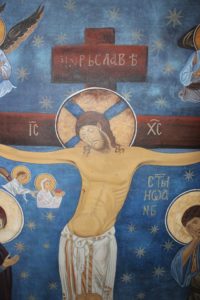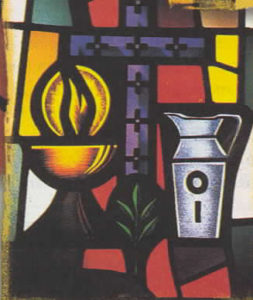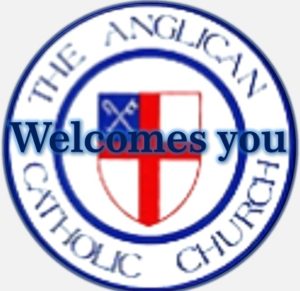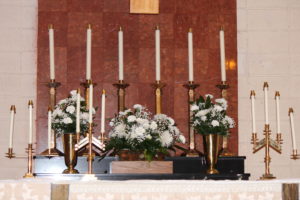At Guardian Angels we remain loyal to the traditional faith of the Catholic Creeds and the Ecumenical Councils, the Apostolic Ministry of male Bishops, Priests, and Deacons, and traditional Christian Biblical Morality. Our worship employs traditional liturgy that became the standard of worship in the western church. Consistent with this, we use the classical Anglican Book of Common Prayer (1928) and the American and Anglican Missals. We also use the Hymnal (1940).
All are welcome at the altar rail to receive Holy Communion or a blessing. Those desiring a blessing should so indicate by crossing their arms. Those who seek Holy Communion must be baptized with water in the Name of the Blessed Trinity, The Father, The Son, and the Holy Ghost/Spirit. They should have been “baptized in the Spirit” by a Bishop in Apostolic Order through the sacrament of Holy Confirmation, or Chrismated by a Priest in the Eastern Tradition, which also admits one to Holy Communion. They should discern the Real Presence of Jesus in the Blessed Sacrament of His Body and Blood, and desire to live an active, responsible, and faithful life in Him. Repentance of your sin is also very important!

HGA Entrance Piece
Our mission is to enable all who seek God to glorify Him in worship and prayer, to serve our Lord Jesus Christ, and to receive His grace, Sacraments, love, healing, peace, and the gift of eternal life.
Anglican, because we use the Book of Common Prayer (1928) and follow the path taken by the Church of England in the 16th century.
Catholic, because we adhere to the faith accepted by all Christians before the Church separated into Eastern and Western branches. We confess the truth of the Faith as established by the Apostles’ and Nicene Creeds.
Church, because we are a community that finds comfort and nourishment in coming together to worship God according to the traditional English liturgy.
The Holy Bible
The early church, guided by the Holy Spirit, selected the writing that were inspired by the same Holy Spirit and placed them together to form the Holy Bible. Therefore, we believe that the Holy Bible is the Word of God.
The Creeds and Tradition
When issues of biblical interpretation arose, the church met to decide the issues under the guidance of the Holy Spirit (cf. St. John 16:13). These meetings are called the Ecumenical Councils. Seven councils of the undivided Church were held between AD 325 and 787. They produced definitive statements of the church’s faith. The core teachings of the councils are summarized in the Creeds. We accept the teachings of the Ecumenical Councils and the three ancient creeds: the Apostle’s Creed, the Nicene Creed, and the Creed of St. Athanasius.

The Apostolic Ministry
Before the Apostles died, they appointed certain men in the church to succeed them in their apostolic ministry. These men were called bishops. The New Testament also mentions elders, or presbyters (who came to be known as priests) and deacons. We maintain the apostolic ministry of bishops, priests, and deacons, standing in unbroken line of succession from the apostles.
The Sacraments
The Word was made flesh in the person of Jesus Christ (St. John 1:1f). Jesus continues to be present to His Church through visible signs called Sacraments. We become members of the body of Christ through the water of baptism (Romans 6:3f, Galatians 3:27). The church gathers together each Sunday to celebrate the Lord’s Supper, in which we feed on “the bread of life” (St. John 6:48-51). We continue to administer the sacraments, through which God pledges grace to His people.
*An unchanging faith in a changing world *


